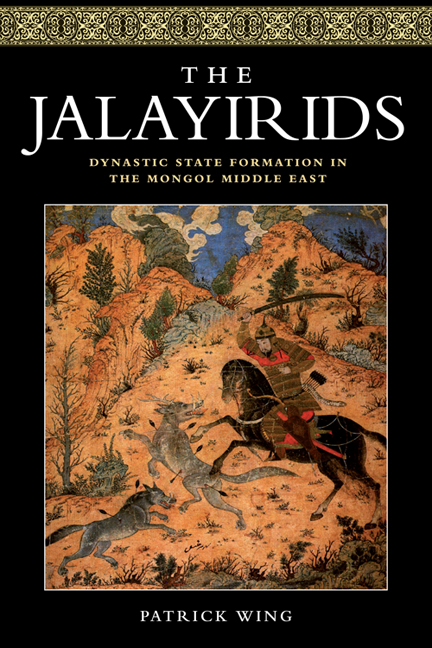Book contents
- Frontmatter
- Contents
- List of Illustrations
- Acknowledgements
- Abbreviations for Primary and Secondary Source Texts
- 1 Introduction and Sources for the History of the Jalayirids
- 2 Tribes and the Chinggisid Empire
- 3 The Jalayirs and the Early Ilkhanate
- 4 From Tribal Amirs to Royal In-laws
- 5 Crisis and Transition (1335–56)
- 6 Shaykh Uvays and the Jalayirid Dynasty
- 7 Dynastic Ideology during the Reign of Shaykh Uvays
- 8 Challenges to the Jalayirid Order
- 9 Conclusions and the Legacy of the Jalayirids
- Maps and Genealogical Chart
- Bibliography
- Index
6 - Shaykh Uvays and the Jalayirid Dynasty
- Frontmatter
- Contents
- List of Illustrations
- Acknowledgements
- Abbreviations for Primary and Secondary Source Texts
- 1 Introduction and Sources for the History of the Jalayirids
- 2 Tribes and the Chinggisid Empire
- 3 The Jalayirs and the Early Ilkhanate
- 4 From Tribal Amirs to Royal In-laws
- 5 Crisis and Transition (1335–56)
- 6 Shaykh Uvays and the Jalayirid Dynasty
- 7 Dynastic Ideology during the Reign of Shaykh Uvays
- 8 Challenges to the Jalayirid Order
- 9 Conclusions and the Legacy of the Jalayirids
- Maps and Genealogical Chart
- Bibliography
- Index
Summary
This chapter examines the political history of the reign of the Jalayirid sultan Shaykh Uvays (757/1356–776/1374). This period witnessed several developments in the dynamics of power and authority in the former Ilkhanid realm. The most significant developments were the Jalayirid conquest of Azarbayjan, Shaykh Uvays's claiming of independent royal authority, and the elimination of the Chubanids as contenders for the Ilkhanid throne. The eighteen-year reign of Shaykh Uvays represents the height of the Jalayirid dynasty's political power, and a critical turning point between the disappearance of the Chinggisid Ilkhans and the rise to power of Tīmūr and his descendants at the end of the eighth/fourteenth century. While this chapter focuses primarily on a chronological analysis of political events during Shaykh Uvays's rule, the following chapter addresses the ideological aspects of his assertion of independent authority as heir to the Ilkhanid tradition.
Shaykh Uvays and the Jalayirid Re-conquest of Azarbayjan
Shaykh Uvays was born in 743/1342–43 to Shaykh Ḥasan and Dilshād Khātūn, the daughter of Dimashq Khwāja Chūbānī and Tūrsun Khātūn. Tūrsun Khātūn was the granddaughter of Aḥmad Tegüder Khan through his daughter Kūnjak Khātūn. With the exception of some basic genealogical information and panegyric found in the Jalayirid chronicle Tārīkh-iShaykh Uvays, all of the Persian narrative sources for the period of Shaykh Uvays's life were written by Timurid historians, including Zayn al-Dīn Qazvīnī, Ḥāfiẓ Abrū and Mu‘īn al-Dīn Naṭanzī. These histories are supplemented by a number of non-narrative sources, including land grant documents, court poetry and a major inshā’ manual.
Shaykh Ḥasan Jalayir died in Rajab 757/July 1356 and was succeeded by his son Shaykh Uvays. Ḥāfiẓ Abrū commemorated his accession with these lines:
In the month of Rajab of the year 757
By the consent of the people and by the favour of the creator
The Khusraw of the face of the earth, by right
Sat upon the throne of sultans in the capital of Iraq
Lord of the sultans of the age, Shaykh Uvays
The absolute refuge and support of the kings of the world
If Shaykh Uvays appears as a glorious ruler in Timurid historical memory, such a legacy seemed far from certain when he succeeded his father in 757/1356.
- Type
- Chapter
- Information
- The JalayiridsDynastic State Formation in the Mongol Middle East, pp. 101 - 128Publisher: Edinburgh University PressPrint publication year: 2016



